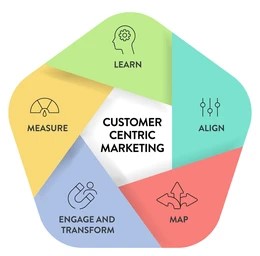Table of contents
In today’s digital age, mobile data has become a powerful tool for building a customer-centric marketing strategy. By understanding how customers engage with your brand on mobile devices, you can tailor your marketing efforts to meet their needs and enhance customer satisfaction.
Why Mobile Data Matters in Marketing
By analyzing mobile data, businesses gain insights into customers’ preferences, behaviors, and interests. This data enables companies to deliver highly relevant content, such as personalized product recommendations, discounts, or promotions. Personalized experiences are a cornerstone of customer-centric marketing strategy, increasing customer satisfaction and making customers feel valued. As a result, businesses foster stronger customer engagement and long-term loyalty.

Key Benefits of Using Mobile Data in Marketing
Enhanced Personalization
By analyzing mobile data, businesses gain insights into customers’ preferences, behaviors, and interests. This data enables companies to deliver highly relevant content, such as personalized product recommendations, discounts, or promotions. Personalized experiences increase customer satisfaction, making customers feel valued. As a result, businesses foster stronger customer engagement and long-term loyalty.
Improved Targeting
Mobile data enables businesses to segment their audience based on various factors such as location, browsing habits, and past purchases. This segmentation helps businesses target the most relevant customers. For example, ads can target people who have shown interest in similar products. Precise targeting increases the likelihood of conversions and reduces ad spend on less relevant audiences.
Better Customer Insights
Mobile data provides a comprehensive view of how customers interact with your brand across multiple touchpoints. By tracking user behavior, businesses can identify patterns and preferences, which helps them pinpoint customer pain points. Understanding these insights allows businesses to refine their marketing strategies, create more appealing content, and improve the overall customer experience.
Real-Time Engagement
With access to real-time mobile data, businesses can monitor customer interactions and adapt quickly. For instance, if a customer abandons their shopping cart, businesses can send a targeted push notification to encourage them to complete the purchase. Real-time data also helps brands send time-sensitive offers, respond to customer inquiries, and update customers on new products, keeping them engaged.
Increased ROI
Using mobile data to optimize marketing campaigns helps businesses spend their resources effectively. By understanding which strategies resonate most with the target audience, businesses can focus on high-performing campaigns. This approach reduces wasteful spending on underperforming tactics and drives a higher return on investment (ROI).
How to Leverage Mobile Data for Your Marketing Strategy
Track Customer Behavior
Use mobile analytics tools to monitor how users interact with your website and apps. This data helps identify popular content and areas where improvements are needed.
Segment Your Audience
Create customer segments based on mobile browsing habits, location data, and past purchases. This enables you to target specific groups with relevant offers.
Offer Location-Based Promotions
Leverage geo-targeting to send personalized offers to customers when they are near your store or in a specific location. This can increase foot traffic and conversion rates.
Optimize Mobile Ads
Ensure your mobile ads are optimized for various devices. By analyzing how customers engage with these ads, you can fine-tune them to increase effectiveness.
Use Push Notifications
Push notifications allow you to directly engage with customers. Use mobile data to send personalized messages based on customer preferences and behavior.
Challenges of Using Mobile Data in Marketing
Privacy Concerns
Ensure your marketing practices comply with privacy regulations like GDPR. Make sure customers are always aware of how you use their data.
Data Overload
With so much data available, businesses can find it challenging to focus on the most valuable insights. Use analytics tools to filter out noise and focus on actionable data.
Integration with Other Channels
Integrating mobile data with other marketing channels, such as email or social media, helps create a unified, customer-centric experience.
Conclusion
Mobile data offers a powerful asset for creating a customer-centric marketing strategy. By leveraging insights into customer behavior, preferences, and location, businesses can build more personalized and effective marketing campaigns. However, businesses must manage customer data responsibly and focus on actionable insights to maximize the value of mobile data.
Read More: How to Use Mobile Marketing to Re-Engage Lapsed Customers
FAQ’s
Mobile data allows businesses to personalize marketing efforts and target customers more effectively.
Mobile data helps businesses segment customers based on behavior, location, purchase history, and enabling targeted marketing.
Yes, businesses must comply with privacy regulations like GDPR to protect customer data.
Yes, by optimizing campaigns based on mobile data insights, businesses can increase ROI by targeting the right customers with relevant offers.

Smith
Welcome to my blog! As a digital marketing expert with over 15 years of experience, I’ve witnessed the transformative power of search engine optimization from the very beginning of my career. In this blog series, I’ll delve into the crucial role SEO and marketing play in the success of small businesses. Join me on this journey to uncover how leveraging data-driven insights and innovative SEO techniques can propel your small business to new heights, attract a broader audience, and drive sustainable growth in the digital age. Whether you’re a seasoned entrepreneur or just starting out, you’ll find valuable insights and practical tips to enhance your digital marketing strategies.


